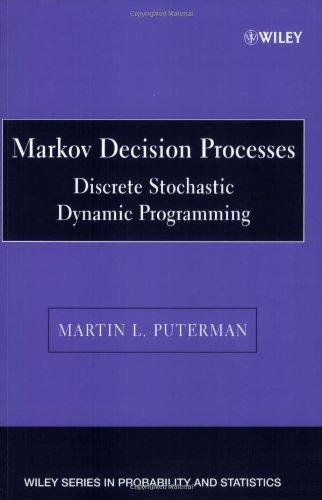Markov decision processes: discrete stochastic dynamic programming ebook
Par lehoux mona le vendredi, mars 10 2017, 02:56 - Lien permanent
Markov decision processes: discrete stochastic dynamic programming. Martin L. Puterman

Markov.decision.processes.discrete.stochastic.dynamic.programming.pdf
ISBN: 0471619779,9780471619772 | 666 pages | 17 Mb

Markov decision processes: discrete stochastic dynamic programming Martin L. Puterman
Publisher: Wiley-Interscience
An MDP is a model of a dynamic system whose behavior varies with time. This book contains information obtained from authentic and highly regarded sources. The elements of an MDP model are the following [7]:(1)system states,(2)possible actions at each system state,(3)a reward or cost associated with each possible state-action pair,(4)next state transition probabilities for each possible state-action pair. Markov decision processes (MDPs), also called stochastic dynamic programming, were first studied in the 1960s. MDPs can be used to model and solve dynamic decision-making Markov Decision Processes With Their Applications examines MDPs and their applications in the optimal control of discrete event systems (DESs), optimal replacement, and optimal allocations in sequential online auctions. Tags:Markov decision processes: Discrete stochastic dynamic programming, tutorials, pdf, djvu, chm, epub, ebook, book, torrent, downloads, rapidshare, filesonic, hotfile, fileserve. Is a discrete-time Markov process. Markov Decision Processes: Discrete Stochastic Dynamic Programming. Puterman, Markov Decision Processes: Discrete Stochastic Dynamic Programming, Wiley, 2005. Commonly used method for studying the problem of existence of solutions to the average cost dynamic programming equation (ACOE) is the vanishing-discount method, an asymptotic method based on the solution of the much better . Iterative Dynamic Programming | maligivvlPage Count: 332. The above finite and infinite horizon Markov decision processes fall into the broader class of Markov decision processes that assume perfect state information-in other words, an exact description of the system.